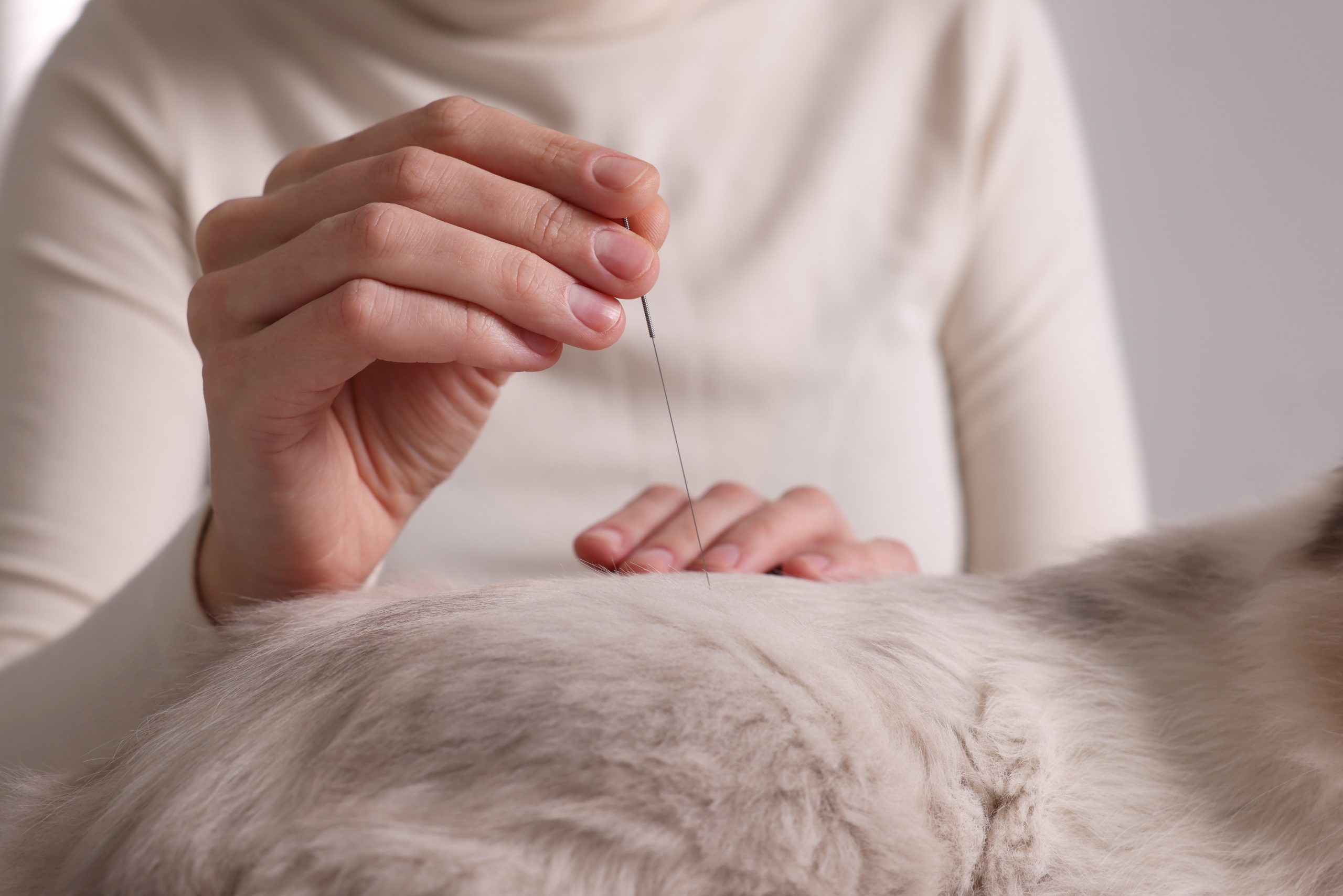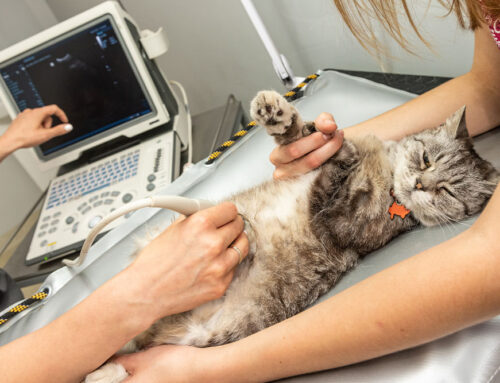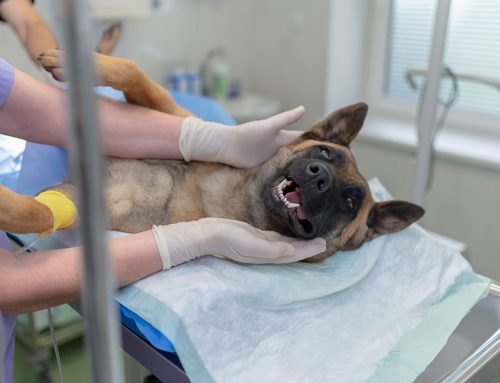Pet pain and disability can take many forms. However, historically, all types of pet pain have been managed the same—through medication and restricted activity (i.e., crate rest). Fortunately, new and ancient therapies are gaining well-deserved recognition for their ability to provide powerful, safe, and targeted pain relief—thereby enhancing pet comfort, mobility, and quality of life.
Alternative medicine and veterinary rehabilitation are non-pharmaceutical treatment options for pets with chronic pain, injury, and disease, and also for healthy athletic or working pets who need to stay in peak condition. As part of our commitment to your pet’s total health, Burlington Veterinary Center proudly provides several alternative and rehabilitative therapies.
Acupuncture for pets
Despite this treatment modality’s pins-and-needles reputation, acupuncture is a gentle, noninvasive practice that pets tolerate well. Although its increasing U.S. popularity can make this therapy seem modern, acupuncture has been practiced in China for more than 3,000 years.
During an acupuncture session, a practitioner uses tiny needles to stimulate specific body pathways, triggering a healing response. Based on a pet’s condition, the needles are placed at strategic positions (i.e., points) along an energy channel (i.e., meridian). The stimulation is said to unblock trapped energy (i.e., qi), which relieves pain, enhances circulation, and promotes relaxation. Your veterinarian may recommend your pet receive acupuncture for conditions such as:
- Musculoskeletal issues (e.g., arthritis, orthopedic conditions)
- Intervertebral disc disease (IVDD)
- Neurologic disorders (e.g., epilepsy, degenerative myelopathy)
- Respiratory problems
- Allergies
- Cancer or chemotherapy-related pain
- Renal failure
- Palliative care
Acupuncture is a popular treatment choice for pets because this modality is non-pharmacologic and generally causes no side effects. Treatment sessions are pleasant—many pets fall asleep—and positive results generally occur within a few visits.

Laser therapy for pets
Laser therapy (i.e., photobiomodulation) uses a specific light wavelength to penetrate your pet’s skin and tissues, activating or accelerating cellular processes. For precise and rapid therapeutic effect, treatments are delivered through a carefully calibrated handpiece that is applied directly on or slightly above the affected area. Because laser therapy stimulates natural cellular activity, this modality’s benefits include:
- Inflammation reduction — By enhancing blood and lymphatic flow to and from damaged tissues, laser therapy accelerates cellular byproduct and waste-product removal.
- Muscle relaxation — Laser therapy delivers soothing warmth to tense or strained muscles, which have often tightened in an attempt to protect an injured area.
- Pain relief — In addition to this modality’s anti-inflammatory and relaxation-promoting properties, laser therapy relieves pain by decreasing nerve sensitivity.
- Wound and incision healing — Enhanced circulation and waste-product removal can speed tissue healing and discourage bacterial growth.
As a relatively new technology, laser therapy applications are constantly emerging. At Burlington Veterinary Center, our most common uses capitalize on this modality’s anti-inflammatory effects for conditions such as:
- Arthritis
- Ear infections
- Postoperative healing
- Gingivitis and stomatitis
- Tooth extraction
- Wounds and bites
- Skin irritation or lesions (e.g., dermatitis, hot spots)
- Orthopedic disease (e.g., hip and elbow dysplasia, cruciate ligament rupture)
A laser therapy session’s frequency and length vary depending on a pet’s condition and their treatment response. After an initial induction phase, treatments can often be reduced to weekly or monthly appointments.
Massage for pets
Veterinary massage is performed by manipulating a pet’s soft tissues in a gentle and strategic way to increase circulation, reduce swelling, relieve tension, and promote healing. To ensure a completely peaceful and relaxing experience, our certified pet massage therapist tailors treatments to each pet’s health condition, temperament, and preferences. Using carefully measured amounts of pressure, traction, and friction, massage can mobilize stiff areas, free tissue adhesions (i.e., attachments), and trigger natural endorphin release. Because this modality’s effects are so powerful, massage is contraindicated for some conditions. Veterinary consent is required to schedule a pet massage appointment. However, pet massage is an ideal treatment modality for numerous conditions, such as:
- Arthritis
- Tendinopathies
- Soft tissue strain or sprain
- Postoperative healing
- Stress and anxiety reduction
- Some behavior disorders
- Palliative and end-of-life care
Herbal therapy for pets
Herbal therapy uses plant-based remedies to provide healing, prevent disease, or alleviate pain. However, despite being natural, some herbs or specific plant parts are highly potent or toxic to pets, and others are contraindicated for certain conditions. In addition, some herbs may counteract prescription medications. For these reasons, herbal therapy should only be pursued if your veterinarian prescribes this treatment modality (i.e., do not consult the internet) and oversees the herbal therapy administration. At Burlington Veterinary Center, our veterinary therapists routinely combine herbal therapy with other alternative treatments, such as acupuncture or laser therapy, to create a synergistic effect. Conditions that benefit from laser therapy and massage also benefit from herbal therapy. Over time, herbal therapy may reduce or eliminate some pets’ need for chronic pain medications.
When your pet is painful, sick, or recovering from an illness or surgery, our Burlington Veterinary Center team is your source for comprehensive veterinary care. Our alternative and rehabilitative medicine services enable us to go beyond traditional treatments, and provide optimal healing and pain relief. If you think your pet could benefit from our expanded care services, contact us to schedule an appointment. Alternatively, you can book online or through our PetDesk app.







Leave A Comment